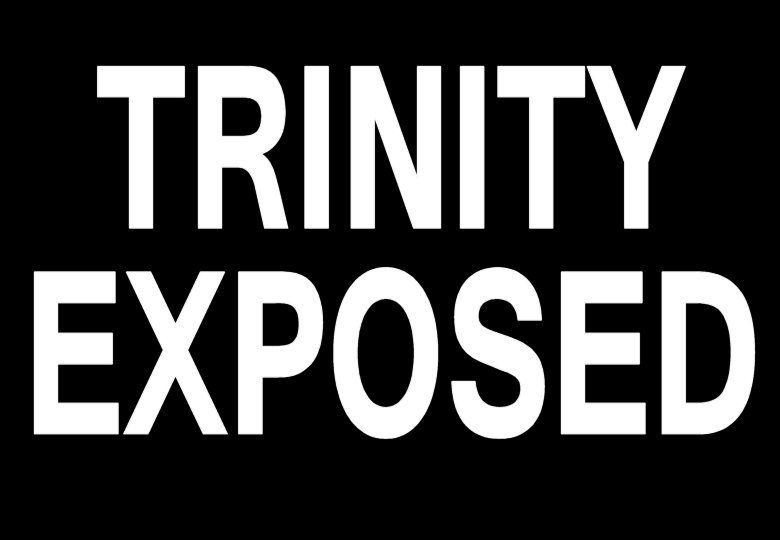
Heard those stories of Christians being fed to the lions and persecuted to death by the Romans in the first century? But in just a couple of centuries, Christianity became the religion of the Roman empire. The pagans became fully paid up ‘Christians’. But… what exactly happened?
Constantine cleverly mixed in elements of paganism with Christianity, so that there could be one religion for his empire. By doing so, of course, he took ‘Christianity’ away from its true Biblical roots. The idea of a ‘trinity’ of gods was widespread in paganism. The Egyptians had three main gods, Osiris, Isis and Horus. Horus was in turn divided into 3 parts or persons. Many ‘tripilisms’ have been discovered in Western Europe- whereby gods were worshipped in threes. For example, the Deae Matres or the Matronae– the three mother goddesses- together formed a unity representing strength, power and fertility. So when Theophilus, bishop of Antioch introduced the word ‘trias’ to Christian literature for the first time in AD170, and the word ‘trinitas’ was first used by Tertullian in AD200, they were importing pagan concepts which were familiar and had been for millenia.
But Deut. 6:4 had for all time made it clear that there is only one God. The God of the New Testament is the same God- 1 Tim. 2:5: “There is one God, and one mediator between God and men, theman Christ Jesus”. Think it through:
“God is not a man” (Num. 23:19; Hos. 11:9); yet Christ was clearly “the man Christ Jesus”. “For since by man [Adam] came death, by man [Jesus] came also the resurrection of the dead” (1 Cor. 15:21). Yet He was also “the Son of the Highest” (Lk. 1:32). God being “The Highest” indicates that only He has ultimate highness; Jesus being “the Son of the Highest” shows that he cannot have been God Himself in person.
In line with this, there are a number of obvious differences between God and Jesus, which clearly show that Jesus was not God himself.
|
God |
Jesus |
| “God cannot be tempted” (James 1:13). | Christ “was in all points tempted like as we are” (Heb. 4:15). |
| God cannot die – He is immortal by nature (Ps. 90:2; 1 Tim. 6:16). | Christ died and was in the grave for three days (Mt. 12:40; 16:21). He was once under the “dominion” of death (Rom. 6:9). |
| God cannot be seen by men (1 Tim. 6:16; Ex. 33:20). | Men saw Jesus and handled him (1 Jn. 1:1 emphasises this). |
When we are tempted, we are forced to choose between sin and obedience to God. Often we choose to disobey God; Christ had the same choices, but always chose to be obedient. He therefore had the possibility of sinning, although he never actually did. It is unthinkable that God has any possibility of sinning. It was vital that Christ was tempted like us, so that through his perfect overcoming of temptation he could gain forgiveness for us. “We have not an high priest which cannot be touched with the feeling of our infirmities; but was in all points tempted like us” (Heb. 4:15) .
Heb. 2:14-18 is very clear: “As the children (us) are partakers of flesh and blood (human nature), he (Christ) also himself likewise partook of the same (nature); that through death he might destroy… the devil… For truly he took not on him the nature of angels; but he took on him the (nature of the) seed of Abraham. Wherefore in all things it was appropriate that he be made like unto his brothers, that he might be a merciful and faithful high priest… to make reconciliation for the sins of the people. For in that he himself has suffered being tempted, he is able to help them that are tempted”. This passage places extraordinary emphasis upon the fact that Jesus had human nature: “He also himself likewise” partook of it (Heb. 2:14). This phrase uses three words all with the same meaning, just to drive the point home. He partook “of the same” nature; the record could have said ‘he partook of IT too’, but it stresses, “he partook of the same”. Heb. 2:16 similarly labours the point that Christ did not have angels’ nature, seeing that he was the seed of Abraham, who had come to bring salvation for the multitude of believers who would become Abraham’s seed. Because of this, it was necessary for Christ to have human nature. In every way he had “to be made like unto his brothers” (Heb. 2:17) so that God could grant us forgiveness through Christ’s sacrifice.
He “prayed, saying, O my Father, if it be possible, let this cup (of suffering and death) pass from me; nevertheless not as I will, but as you will” (Mt. 26:39). This indicates that at times Christ’s fleshly desires were different from those of God. However, during his whole life Christ always submitted his own will to that of God in preparation for this final trial of the cross. “I can of mine own self do nothing: as I hear, I judge: and my judgment is just; because I seek not mine own will, but the will of the Father which has sent me” (Jn. 5:30). This difference between Christ’s will and that of God is proof enough that Jesus was not God.
Throughout our lives we are expected to grow in our knowledge of God, learning from the trials which we experience in life. In this, Jesus was our great example. He did not have complete knowledge of God poured into him any more than we have. From childhood “Jesus increased in wisdom and stature (i.e. spiritual maturity, cp. Eph. 4:13), and in favour with God and man” (Lk. 2:52). “The child grew, and became strong in spirit” (Lk. 2:40). These two verses portray Christ’s physical growth as parallel to his spiritual development; the growth process occurred in him both naturally and spiritually. If “The Son is God”, as the Athanasian Creed states concerning the ‘Trinity’, this would not have been possible. Even at the end of his life, Christ admitted that he did not know the exact time of his second coming, although the Father did (Mk. 13:32). He asked questions of the teachers of the Law at age 12, eager to learn; and often He spoke of what He had learnt andbeen taught by His Father.
People today- young people especially- are so often asking the ultimate questions, but looking for the answers in the wrong places. In God and in His Son Jesus, as the Bible reveals them, stripped of all the theology of men, the accretions of nominal Christian culture… we find just what we need and were unconsciously looking for, even longing for, all our lives. The Bible predicates the life eternal upon ‘knowing Christ’. Therefore understanding Him assumes a vital place in human life, both now and eternally. For as Paul succinctly put it: “To live is Christ”. Give yourself no rest until you are confident that you have come to know Him in spirit and in truth.
SUMMARY INSERT:
The Trinity: UnBiblical Teaching
– Constantine mixed paganism’s concept of three gods into Christianity
– There is only one God (Dt. 6:4; 1 Tim. 2:5) who is the Father (1 Cor. 8:6). Therefore nobody else, including the Son, can be God- if the only one God is the Father
– “God is not a man” (Num. 23:19; Hos. 11:9); yet Christ was clearly “the man Christ Jesus”. “For since by man [Adam] came death, by man [Jesus] came also the resurrection of the dead” (1 Cor. 15:21).
– “God cannot be tempted” (James 1:13). Christ “was in all points tempted like as we are” (Heb. 4:15).
– God cannot die – He is immortal by nature (Ps. 90:2; 1 Tim. 6:16). Christ died and was in the grave for three days (Mt. 12:40; 16:21). He was once under the “dominion” of death (Rom. 6:9).
– God cannot be seen by men (1 Tim. 6:16; Ex. 33:20). Men saw Jesus and handled him (1 Jn. 1:1).
– Jesus had our human nature (Heb. 2:14-18; 4:15).


